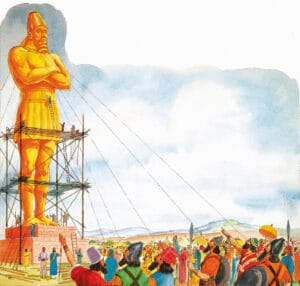Daily Lesson for Monday 16th of June 2025
However much fealty Nebuchadnezzar, impressed by what Daniel had done, at first paid to Daniel and to his God (see Daniel 2:1-49, especially vv. 46–48), it didn’t last.
Read Daniel 3:1-12. What significance can be found in the fact that the statue was all gold and that the king demanded that it be worshiped?
The king underscored his defiance of God’s message by constructing a statue made entirely of gold. The message? Babylon will never fall, and Nebuchadnezzar will always be king. And anybody who dared to challenge that idea would be put to death. It serves as a powerful reminder that our human desire for self-determination can quickly blind us to the truth about how the great controversy will most certainly play out.
In some ways, Nebuchadnezzar displays characteristics of Lucifer: he was ambitious, self-important, and prideful enough to rebel openly against God’s authority. In other ways, of course, there are marked differences: Nebuchadnezzar eventually came to faith in the true God, and it is likely that we will meet him in the kingdom he originally fought so hard to defy.
Read Daniel 3:17-18, the words of the three Hebrew boys in defiance of the king. What does this teach us about faith and what at times it could demand of us?
Think how easily these three men could have rationalized their way out of this dangerous situation. After all, were they not being fanatics, willing to be burned alive over merely bowing down? Couldn’t they have just faked it, bowing to tie their shoelaces while praying to their own God? Was it really worth what they were facing? Obviously, they thought so, even though their words showed that they knew that they might not escape with their lives.
|
How can we avoid the easy rationalizations that present us with opportunities to compromise on our faith? What does this text say that addresses a similar temptation: “ ‘He who is faithful in what is least is faithful also in much; and he who is unjust in what is least is unjust also in much’ ” (Luke 16:10, NKJV)? |
 (0)
(0)



